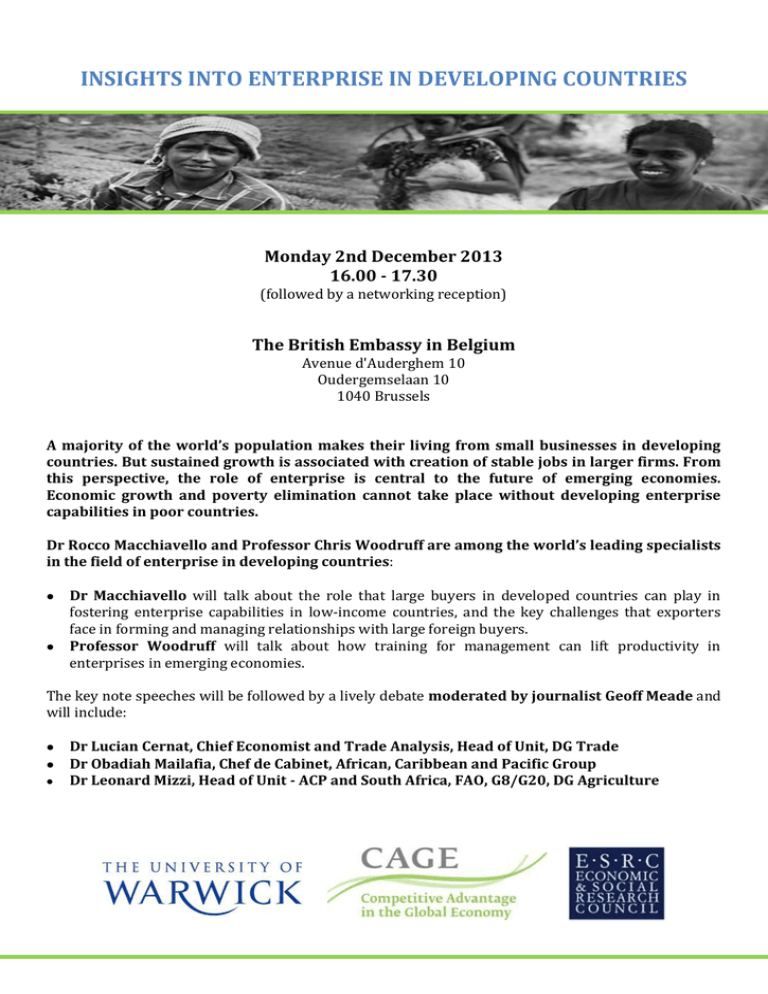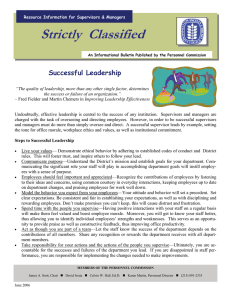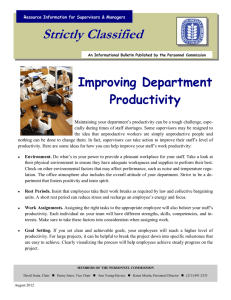INSIGHTS INTO ENTERPRISE IN DEVELOPING COUNTRIES Monday 2nd December 2013
advertisement

INSIGHTS INTO ENTERPRISE IN DEVELOPING COUNTRIES Monday 2nd December 2013 16.00 - 17.30 (followed by a networking reception) The British Embassy in Belgium Avenue d'Auderghem 10 Oudergemselaan 10 1040 Brussels A majority of the world’s population makes their living from small businesses in developing countries. But sustained growth is associated with creation of stable jobs in larger firms. From this perspective, the role of enterprise is central to the future of emerging economies. Economic growth and poverty elimination cannot take place without developing enterprise capabilities in poor countries. Dr Rocco Macchiavello and Professor Chris Woodruff are among the world’s leading specialists in the field of enterprise in developing countries: Dr Macchiavello will talk about the role that large buyers in developed countries can play in fostering enterprise capabilities in low-income countries, and the key challenges that exporters face in forming and managing relationships with large foreign buyers. Professor Woodruff will talk about how training for management can lift productivity in enterprises in emerging economies. The key note speeches will be followed by a lively debate moderated by journalist Geoff Meade and will include: Dr Lucian Cernat, Chief Economist and Trade Analysis, Head of Unit, DG Trade Dr Obadiah Mailafia, Chef de Cabinet, African, Caribbean and Pacific Group Dr Leonard Mizzi, Head of Unit - ACP and South Africa, FAO, G8/G20, DG Agriculture Rocco Macchiavello • The Value of Relationships: Northern Buyers and Southern Producers Motivation Globalization – the cheaper and faster movement of goods, services, people, and ideas – has given producers in developing countries the opportunity to serve larger, richer and more demanding foreign markets. Between developing-country producers and western consumers sit large buyers such as Walmart, Carrefour, Tesco, and H&M. These companies are typically much larger than their suppliers, with stronger bargaining and financial power. They often get a negative press: for example, they are frequently accused of imposing poor labour standards and workers’ conditions to keep prices low. There is another side. Collaborative relationships between western buyers and producers in developing countries can also promote development by relaxing institutional constraints, unleashing entrepreneurial activity, and pushing up productivity and wages. How can this be done? It is not apparent from the model presented in the standard Economics 101 textbook. In this model the market is perfectly competitive, information is freely available and symmetrically distributed, and it is costless to enforce a contract or promises. In this model relationships are irrelevant and have no value. If so, the market will take care of everything! But this is an abstraction from the reality facing many producers, especially those in developing countries. There the environment is difficult for several reasons: Excessive regulation leads to corruption and weak competition, with significant barriers to entry so that profitable investments are not made. Contracts are weakly enforced, especially in the credit market, so that firms have difficulty in expanding to seize profitable investment opportunities. Domestic consumer markets are relatively underdeveloped because most households have low incomes. In this setting, collaborative relationships with foreign buyers are valuable because they can yield solutions to some (though not all) problems. For example, foreign buyers can offer access to much wider markets; they can provide business finance; and they can enhance capabilities. At the same time, valuable relationships are hard to initiate and hard to sustain. This is true in general, and particularly so in the context of international trade where there are higher costs of monitoring and enforcing contracts across international borders, and these are reinforced by cultural differences. Three Case Studies The presentation is based on three case studies, involving wine (exported from Chile to the UK), flowers (from Kenya to Europe), and specialty coffee (from around the world to the U.S.). The methodology is common across the cases: we combine very detailed transaction-level data with “natural experiments” to uncover the key market imperfections. In each case a natural experiment is provided by an unanticipated event that affects how profitable or costly it is for the buyer and seller to collaborate. Key findings are as follows: Successful Chilean exporters of wines see the price they receive for the same bottle rise by 2 to 3% a year over the course of a relationship with their U.K. distributor. The gain is explained by experience accumulated in the relationship with the same distributor, not experience in selling the same wine. In Kenya in 2008, post-election violence hit the flower industry severely: for a time, workers could not travel to work and pick roses on large farms. Unexpectedly, exporters had to revise their plans and choose which of their buyers to “prioritize”. What did they do? They prioritized buyers with whom they had more valuable relationships. This suggests that a hard-won reputation for reliability is a more important source of value than the insurance that a buyer might provide. When access to working-capital is difficult, exporters can harness the value of their reputations accumulated with foreign buyers to expand credit access. This can happen directly (the buyer lends short-term) or indirectly (a lender uses accounts receivable). In the coffee value chain, these loans are valuable: when exporters can access credit, they can purchase more coffee, pushing up prices in the countryside. A coherent picture emerges from these studies: Relationships are valuable: they are worth at least 15% of Chilean wine sales, 15% of Kenyan flower sales, and 25% of specialty coffee sales. These are economic rents (they are not available in the open market, only from specific relationships). This implies that many profitable relationships cannot be started because of poor contract enforcement. Learning is important. Relationships are valuable because learning about an exporter’s reliability takes time. This tends to be the salient aspect of the relationship when exporters are newer and less established than buyers. In this setting, early disappointments can shape negative perceptions, stopping many valuable relationships from forming. Policy implications Every relationship is different in the sources of value and relative amounts that they yield. The devil is in the detail. Given that, what general lessons can policy makers learn? An overarching lesson is the importance of improving the legal framework in which courts enforce contracts. This is not only a general development requirement; it will also improve export performance by raising rates of formation of profitable buyer-seller relationships. Export promotion policies should have a wider remit than merely subsidies to organize and attend trade fairs. They should also aim to strengthen the information systems that improve contract enforcement. For example, credible boards and associations can disseminate information on contract breaches and also deliver transparent, low-cost arbitration. Policies aimed at fostering domestic value chains must give more attention to the subtle relationships between competition, contract enforcement and access to finance. Here credible monitoring institutions such as Costa Rica’s ICAFÉ can play an important role. Chris Woodruff • Research Partnerships and Productivity in the Bangladeshi Garment Sector Summary Under an agreement with the German Society for International Cooperation (GIZ) we are evaluating two training projects in the Bangladeshi garment industry. A first partnership with GIZ, Tesco, Sainsbury’s and 60 Bangladeshi factories is training female sewing machine operators to be line supervisors. A second partnership with GIZ, H&M, and 26 Bangladeshi factories is training existing supervisors. Both projects are ongoing; the first has given initial results. Promotion: Around 55 per cent of the 220 females trained in the program have been promoted to supervisor. 85 percent of a smaller group of males trained for comparison purposes were promoted. Previously existing female supervisors were viewed as weaker than their male counterparts in three areas: technical skills, communication with upper management, and quality control. The training appears to have more than closed the gap with existing male supervisors in the first two areas, but not the third. Preliminary analysis of detailed production data suggest that female trainees reduce absenteeism rates relative to existing supervisors. Compared with male trainees, there are no significant differences in productivity or quality control, though female trainees appear to perform slightly better in the first area and slightly worse in the second. Our project can be a model for a research partnership between academics, firms in developing countries, and foreign buyers: We have generated data that answer practical questions about how to improve productivity, of particular interest to local producers, as well as of wider interest to scholars. We have shown the value of training in a “softer” management style, which has increased communication between supervisors and workers. Industry background: The garment sector employs 4 million workers in Bangladesh, of whom about 80% are women. The sector has been largely responsible for an increase in female labour force participation from 24% in 2000 to 36% in 2010 (according to ILO data). Yet fewer than 10% of managers are female. Very few existing supervisors have received any formal supervisory training. In our survey of several hundred existing supervisors, only one in five reports having had any training; only one in 20 has received formal training outside the factory. In-factory programs are of varying quality. Several well-publicized disasters in the industry have focused foreign buyers’ attention on issues of social compliance. Basic training is viewed as one step toward improving the conditions of workers in the factories. Project A. Female Operator to Supervisor Working with local training companies, GIZ developed a sixweek (36 day) program to train female sewing machine operators to be line supervisors. Though they successfully piloted the program in 2009, they had not seen the program carried through in the market. We agreed that more rigorous evidence of the effectiveness of the training – and of female supervisors more generally – was an important step in developing sustained interest in the program. We designed a project to train four females and one male (for comparison purposes) in each of close to 100 factories. In the first phase of the project, we have trained around 300 operators from 60 factories. The second phase is scheduled to begin in early 2014. While important in its own right, the training program is also a vehicle to convince factories to experiment with promoting more females to be supervisors. Many factories in the sample had no female supervisors. We have found mixed results. We find significantly lower rates of promotion for women (55%) than for men (85%). At the same time the training increased the female supervisory ranks by around a third (before the training, according to our estimates, around 300 of the estimated 3,600 supervisors in the factories we worked with were female). We also find that the training has been effective in closing some perceived gaps between female and male supervisors. We are still assembling more detailed production data from the factories. Project B. Existing Supervisors We partnered with GIZ and H&M to assess the effectiveness of a compressed version of the GIZ training program. If training is effective, it is puzzling that a market for supervisor training has not developed. We first worked with GIZ and the training companies to split the six-week training program into three modules, compressed to one week each. Then, working with H&M, we approached 32 factories to participate in a randomized control trial to assess the program; 26 agreed to participate. The project is ongoing, but we have had excellent cooperation with the research protocol. Surveys conducted after the training suggest that those receiving the training early were experimenting with new production and management techniques on their lines at significantly higher rates than supervisors who had not yet received the training. A second objective is to understand why a market for supervisor training has not developed spontaneously. We are working with the Bangladeshi company that provides the training to market the modules to a much broader set of firms. This is the first time the training company has marketed a training program directly to factories. The process lets us talk to factories about training, and better understand the factors they take into account when considering training. Thoughts on policy implications: Our research has not yet led to immediate policy deliverables, but it suggests what ought to become doable in future. Evidence is a public good. We should expect private firms to under-provide it. Scholars need evidence to do research, but the private sector needs evidence too. Firms need evidence to decide how much to invest in physical and human capital, including training in general and specifically the promotion of women. Partnerships between academics, aid agencies, and the private sector may be efficient ways to provide the evidence we all need. The most important clients in developing-country markets for business services are often not the country’s producers, but foreign aid agencies and foreign traders. We need to look for ways to re-orient the focus of firms providing business services in developing countries, such as training, onto the producers. About Rocco Macchiavello About Christopher Woodruff Rocco is Associate Professor of Economics at the University of Warwick. He has done extensive field work in Bangladesh, Kenya and Rwanda. Rocco's research interests mainly focus on the microeconomics of development. His recent projects analyse the process by which exporters from developing countries acquire valuable reputations in foreign markets, the upgrading of production process linked with international trade and agricultural value chains. Rocco holds a PhD from the London School of Economics and was a Post-Doctoral Research Fellow at Nuffield College, Oxford, before joining Warwick. He is an associate editor of the Journal of Development Economics. Chris is Professor of Economics at the University of Warwick. He is a leading expert on enterprises in developing countries and a pioneer in the use of field experiments in understanding enterprise dynamics. His recent work includes measuring rates of return to capital investments in micro-enterprises, the effect of formal registration on enterprise performance, the use of business plan competitions to identify small enterprises with potential for rapid growth and the use of temporary wage subsidies to understand the willingness of micro-enterprises to expand employment. His previous work examined the ability of informal contracting and private institutions, such as trade associations to govern trading relations in the absence of functioning state institutions. Geographically, his research spans a broad area of the developing world, including Mexico, Vietnam, Sri Lanka, Ghana and Eastern Europe. He is a Research Associate at the National Bureau of Economic Research (NBER), a Research Fellow at the Centre for Economic Policy Research (CEPR), a Senior Fellow of the Bureau of Research on Economic Analysis and Development (BREAD), a Research Fellow at the Centre for Competitive Advantage and the Global Economy (CAGE) and a Research Fellow at the Institute for the Study of Labour (IZA). He directs the Firm Capabilities group at the International Growth Centre and is the Scientific Coordinator for the DFID–CEPR joint research venture on Private Enterprise Development in Low Income Countries (PEDL). He is a member of the editorial boards of the Journal of Development Economics, the World Bank Economic Review, the Journal of Comparative Economics and the Journal of African Economies. Prior to joining the University of Warwick, he was Professor of Economics at University of California, San Diego, where he also served as Director of the Center for U.S.-Mexican Studies from 2003 to 2008. About related research Blouin, Arthur, and Rocco Macchiavello (2013), “Tropical Lending: International Prices, Strategic Default and Credit Constraints among Coffee Washing Stations,” Working paper, University of Warwick, Department of Economics. Weblink: http://goo.gl/wZtofV. de Mel, Suresh, David Mckenzie, and Christopher Woodruff (2012), “Business Training and Female Enterprise Start-up, Growth, and Dynamics: Experimental evidence from Sri Lanka.” CAGE working paper no. 98. Forthcoming in the World Bank Research Observer. Weblink: http://goo.gl/Vu8WAT. Macchiavello, Rocco (2010), “Development Uncorked: Reputation Acquisition in the New Market for Chilean Wines in the UK.” Working paper, University of Warwick, Department of Economics. Weblink: http://goo.gl/2upnKB. Macchiavello, Rocco, and Ameet Morjaria (2013), “The Value of Relationships: Evidence from a Supply Shock to Kenya Rose Exports.” Working paper, University of Warwick, Department of Economics. Weblink: http://goo.gl/gYbbva. McKenzie, David, and Christopher Woodruff (2013), “What are we learning from business training and entrepreneurship evaluations around the developing world?” CAGE working paper no. 116. Forthcoming in the World Bank Research Observer. Weblink: http://goo.gl/OG396T. About the Centre on Competitive Advantage in the Global Economy (CAGE) Established in January 2010, CAGE is a research centre in the Department of Economics at the University of Warwick. Funded by the Economic and Social Research Council (ESRC), CAGE is carrying out a 5 year programme of innovative research. The centre’s research programme is focused on how countries succeed in achieving key economic objectives such as improving living standards, raising productivity, and maintaining international competitiveness, which are central to the economic wellbeing of their citizens. Our research analyses the reasons for economic outcomes both in developed economies like the UK and emerging economies such as China and India. We aim to develop a better understanding of how to promote institutions and policies which are conducive to successful economic performance and endeavour to draw lessons for policy makers from economic history as well as the contemporary world. Research at CAGE examines how and why different countries achieve economic success. CAGE defines ‘success’ in terms of wellbeing as well as productivity. The research uses economic analysis to address real-world policy issues. The centre is distinctive in providing a perspective that draws on economic history as well as economic theory and is applied to countries at various different stages of economic development. Research is organised under three themes: What explains catching up, forging ahead or falling behind in economic growth over the long run. What permits countries to adjust successfully to new opportunities and challenges presented by global economic development. When succeeding in the global economy translates into reduced deprivation and enhanced general wellbeing




